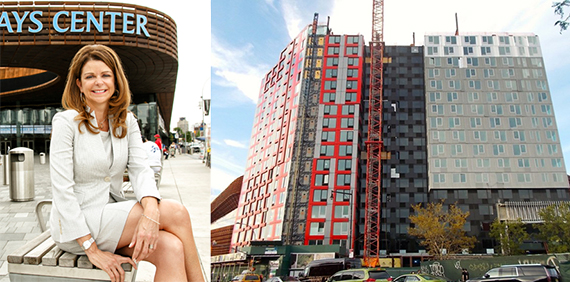Forest City Ratner has notified the New York State Department of Labor that it may lay off 220 employees from its newly formed modular division in 90 days, The Real Deal has learned.
The news comes as the developer starts to wrap up construction on its first modular project — “B2” — at 461 Dean Street, a 32-story tower near the corner of Flatbush Avenue. Once completed, the project, built out of modules assembled at a factory at the Brooklyn Navy Yard, is slated to be the tallest modular building in the world.
Layoffs at FC Modular may come as a surprise to workers, since Forest City made moves as recently as this spring that suggested it planned to keep its Navy Yard factory running after the completion of the building. In May, the company tapped Susan Hayes, formerly an executive at construction firm Cauldwell Wingate, to head the modular division.
While Forest City has no plans to build more modular buildings at its Pacific Park megaproject in Brooklyn – its partner, Chinese firm Greenland Holdings USA, has said it likely won’t use modular for the remainder of the Pacific Park project — the factory would have served other developers in the tri-state region. But so far, outside projects have not materialized.
If Forest City hasn’t inked any modular contracts by the end of the 90-day period, the axe may come down on the construction workers.
The company said it will offer financial incentives for workers to stay at the firm amid the uncertainty in a bid to make sure it still has a workforce in the event of securing a new project.
“Today, as required by state law, FC Modular issued a ‘warn notice’ to our factory employees, Hayes said in a statement. “We are committed to modular construction and are actively pursuing future opportunities once factory work on 461 Dean Street is complete.”
The 363-unit building is slated to open in the third quarter of 2016, with the fabrication of the modules slated for completion by the end of February.
It hasn’t been smooth sailing for the project, which incurred significant delays and cost overruns stemming from a legal battle between Forest City and B2’s former construction manager, Swedish company Skanska. Skanska claimed that the cost overruns arose because Ratner’s designs were flawed, while Forest City said Skanska had closed the module factory to get more money out of the company.
The factory even briefly shut down before Forest City bought Skanska out of its stake in the modular operation.
Forest City CEO MaryAnne Gilmartin, who said said she still holds out hope that Greenland will fall in love with modular once it sees the completed B2, has been a fierce proponent of modular building techniques even amid the delays.
“To prove out the model, we need B2 to open up. We need people to walk through and say, ‘This is beautiful, it looks just as good as the building down the street,’” she said at an event last year.
Jeff Brown, a modular developer who built the Stack, a pre-fab building in Upper Manhattan, said the closure of the factory wouldn’t necessarily be a death knell for modular so much as the result or Forest City’s efforts gone awry following the Skanska dispute.
“They’d initially planned to do many buildings using this technology and build for others, as well,” he said. “Neither of those really transpired. In a lot of way, it was just a bit too ambitious.”
But the closure of Forest City’s modular operation would just be the latest sign that the future for modular in New York is not as bright as it once seemed.
In October, pioneering modular manufacturer Capsys, which produced modules for developments such as the micro-apartment building 335 East 27th Street in Manhattan and the townhouse complex Atlantic Center in Fort Green, revealed it would shutter after almost 20 years in business.
The city’s modular businesses are under threat from overseas producers, such as Polish firm Polcom, which some say provide a cheaper solution.
A spokesperson for the Building and Construction Trades Council of Greater New York said the group was at the ready to advocate for the interests of the workers in the event of layoffs.
“We will, if necessary, exercise our right to bargain over the closing of the production facility,” he said.
